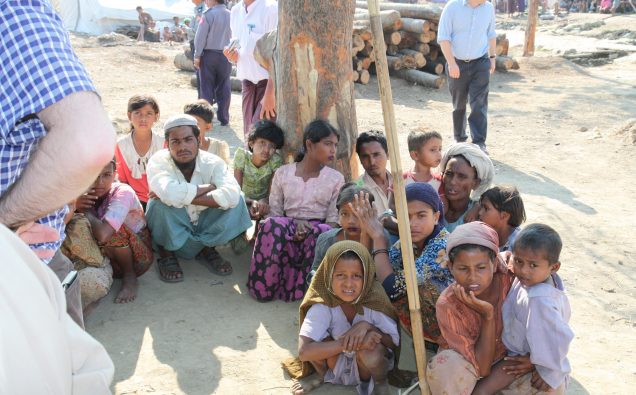
The Rohingya cause is lost, lamented Dr. Wakar Uddin’s father on learning of Mr. Jinnah’s death in 1948. Along with a Rohingya delegation, he had met Mr. Jinnah, the Quaid-i-Azam, twice in Dacca before independence. They had come to discuss the Rohingya areas joining the new state of Pakistan, and Jinnah was interested. It was, after all, adjacent to East Pakistan, and being a Muslim-majority region, the move was in keeping with the basic principle of the partition of British India. Dr. Wakar recalls his father speaking of Jinnah with warm admiration. He described the Quaid as “very handsome, a man of integrity and one who cared for Muslims.”
When he walked into my office, Dr. Wakar Uddin startled me by speaking fluent Urdu in a clear South Asian accent. He said most educated families of that generation spoke Urdu and had an affinity for South Asian Muslim culture. Today, Dr. Wakar Uddin is a Professor at Pennsylvania State University, the chairman of Burmese Rohingya Association of North America, and the director general of the Arakan Rohingya Union.
The fears of Dr. Wakar Uddin’s father were justified. Seven decades later, the Rohingya face genocide. Today estimates tell us that some 400,000 have escaped the latest round of military violence mostly to Bangladesh. This latest bout of brutality and displacement comes as the gory culmination of decades and even centuries of discrimination and subjugation by the Burmese government.
At the heart of every genocide lies a great theft. The Kingdom of Arakan, from where the Rohingya originate, was conquered by the Burmese Kingdom in 1785, and tensions immediately arose as the Rohingya were forced into slave labor. Following the rise and fall of British colonialism in the region and the establishment of military rule following a 1962 coup, the politics of “Burmanisation” was put into practice.
The Rohingya were officially excluded from Burma upon the ratification of the 1974 constitution, which named 135 indigenous ethnic groups, but not the Rohingya. After the 1970s, the military launched campaigns against them based on what they called the “four cuts” strategy, which denied them land, food, shelter, and security. Their mosques were destroyed, lands seized, women raped, and torture was common. The aim was to terrorize the Rohingya into fleeing the land. As manyas 250,000 fled into Bangladesh as a result of that early campaign, a stark example of planned and coordinated ethnic cleansing.
The Rohingya were officially banned from ever becoming citizens in 1982. In the early 1990s, the NaSaKa border security force formed and subjugated the Rohingya of Rakhine State to slave labor to build villages and infrastructure for Buddhist settlers on Rohingya land. Meanwhile, the Rohingya were barred from military and civil service, business ownership, the obtaining of loans, or building or repairing mosques or madrassas. They are even required to obtain travel permits to visit neighboring villages, let alone leave Rakhine State.
To add to their plight, most Rohingya refugees were not officially recognized in Bangladesh. In 2011, Bangladesh rejected UN refugee aid to try and discourage more Rohingya from crossing into the country.
In 2012, President Thein Sein’s government declared its desire to turn over the Rohingya to the UNHCR, and they even went so far as to try and link the Rohingya to the Taliban in an attempt to align them with the War on Terror. Still today, many of the Burmese majority refer to the Rohingya as terrorists out to attack them.
What is even more stunning in all this is noting the silence of Suu Kyi. This tragedy has transformed her from being a symbol for resistance and democracy to a leader complicit in genocide. Some have noticed: Turkish President Recep Tayyip Erdogan has pointed to the “cruelty” facing the Rohingya. Fellow Nobel Laureate Archbishop Desmond Tutu wrote an open letter of protest to Suu Kyi, as did our very own Nobel Laureate, Malala Yousafzai.
Meanwhile, far too many around the world are watching without pity as the genocide of an entire race plays out on our TV sets. And far too many Muslims, for all their talk of supporting the Ummah, are sitting indifferently on the sidelines.
Perhaps we should all heed the wise words of Pope Francis, reaching out as the leader of the Catholic Church to the Muslim Rohingya. “I would like to express my full closeness to them – and let all of us ask the Lord to save them, and to raise up men and women of good will to help them, who shall give them their full rights.”
Dr. Wakar Uddin’s father was impressed by Mr. Jinnah for being “handsome.” But he also saw something else inside the man –Jinnah cared for people regardless of race or religion, especially the downtrodden and vulnerable. Many admirers have equally written of the charm and elegance of Suu Kyi. But her treatment of the Rohingya has exposed something dark in her.
Buddhism is a peaceful and beautiful religion and one of the great Buddhist faith leaders, the Dalai Lama, has reminded Suu Kyi that Buddha would have “definitely helped” the Rohingya. Stripping her of the Nobel Peace Prize would merely be a symbolic act. She has to face her own conscience by begging forgiveness of the Rohingya people for the destruction her acts of omission and commission have wrought on them

















